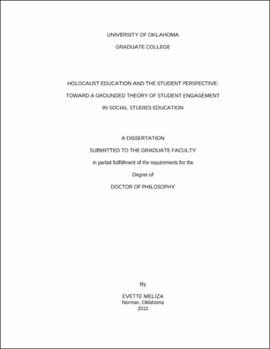| dc.contributor.advisor | Chiodo, John J. | |
| dc.creator | Meliza, Evette | |
| dc.date.accessioned | 2019-04-27T21:39:37Z | |
| dc.date.available | 2019-04-27T21:39:37Z | |
| dc.date.issued | 2010 | |
| dc.identifier | 9964658402042 | |
| dc.identifier.uri | https://hdl.handle.net/11244/319294 | |
| dc.description.abstract | Too often students perceive history as boring with no relevance to their lives; however, this does not seem to be the case with one aspect of social studies education - Holocaust studies. Why do students choose to study about the Holocaust, but choose social studies in general as a subject they would least like to study? | |
| dc.description.abstract | One problem for social studies education is engaging students in social studies content in a way such that they choose to learn more. The challenge is to identify factors that will encourage students to choose to learn more about social studies. | |
| dc.description.abstract | Focusing on the question "What factors influence students' choice to learn more about the Holocaust?," this qualitative study of one high school history classroom examines the factors which influence students' choice to learn about the Holocaust, in particular, and social studies, in general. Students in an Advanced Placement European History class in a large metropolitan high school in the southeastern United States were asked a number of interview questions to ascertain their perceptions of Holocaust education in the United States and to determine the factors which contributed to their choice to learn about the Holocaust. | |
| dc.description.abstract | Findings indicated that students were aware of the Holocaust, believed that distance from the event allowed people to view the Holocaust as history, that the Holocaust should be taught since it is an important event in history, and that it can effectively be taught using Holocaust literature. When data were analyzed, four themes emerged as factors that influenced students' choice to learn. Those factors included: 1) interest, 2) desire for good grades, 3) perceived expectations of others, and 4) obligation to society. | |
| dc.description.abstract | Findings from this study suggest implications for history classrooms, in particular, and social studies education, in general. | |
| dc.format.extent | 149 pages | |
| dc.format.medium | application.pdf | |
| dc.language | en_US | |
| dc.relation.requires | Adobe Acrobat Reader | |
| dc.subject | Holocaust, Jewish (1939-1945)--Study and teaching (Secondary) | |
| dc.subject | History--Study and teaching (Secondary) | |
| dc.title | Holocaust Education and the Student Perspective: Toward a Grounded Theory of Student Engagment in Social Studies Education | |
| dc.type | text | |
| dc.type | document | |
| dc.thesis.degree | Ph.D. | |
| ou.group | Jeannine Rainbolt College of Education::Department of Instructional Leadership and Academic Curriculum | |
